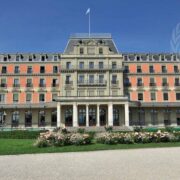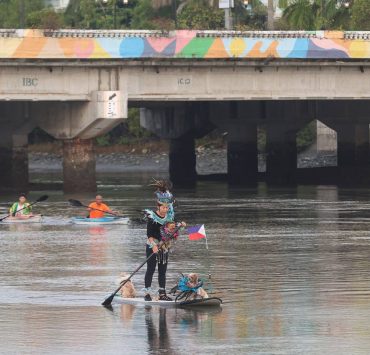‘Dagyang ta!’
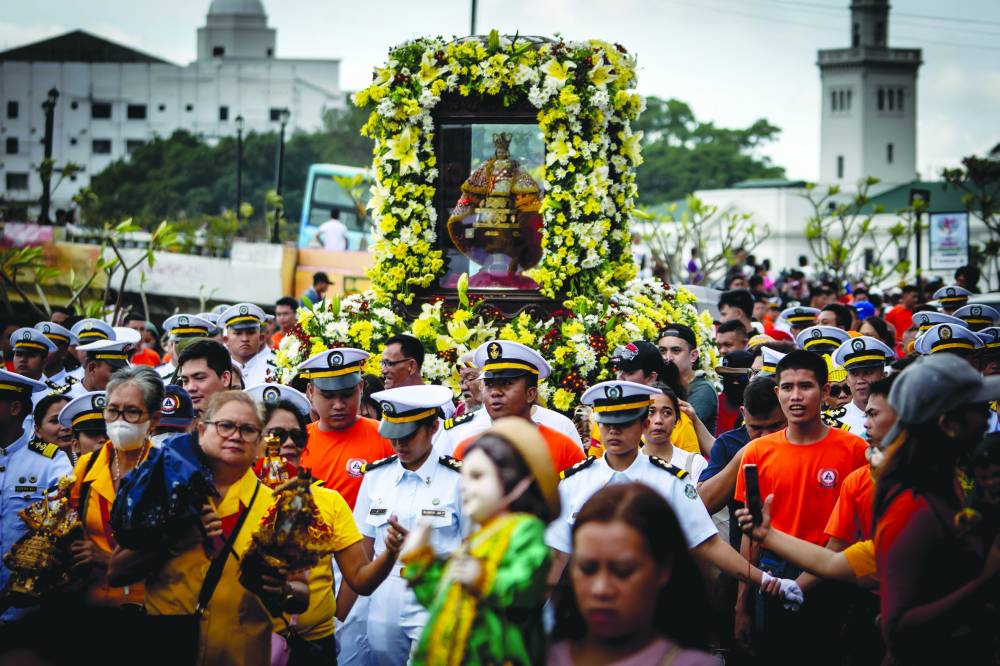
ILOILO CITY—“Dagyang ta!” for Ilonggos is not only an invitation to enjoy and experience the famed Dinagyang Festival.
It is also a call to witness how faith and devotion to the Holy Child Jesus has evolved into a celebration that showcases Iloilo’s rich yet complex history and culture.
Today’s Dinagyang Festival is culminating with much-anticipated major events—Parade of Lights (ILOmination), Kasadyahan sa Kabanwahanan, Religious Sadsad, Ati Tribes competition and Sadsad sa Calle Real.
In both Kasadyahan and Ati Tribe competitions, groups perform in five staging areas in the city center.
The weekend celebration kicked off on Friday with a fluvial procession in Iloilo River followed by a foot procession that brought the image of Sto. Niño to its home in San Jose de Placer Parish Church.
Children dressed like the Child Jesus and Sto. Niño images dressed in different attires was a heartwarming sight to behold.
Friday night’s festivities concluded with the Dinagyang ILOmination Streetdance Competition, a recently added attraction of Dinagyang.
Seven groups performed —Tribu Ilonggohanon (City Proper), Tribu Kahirup of Pavia (Arevalo), Tribu Manduryaw (Mandurriao), Tribu Sagasa (La Paz), Tribu Sidlangan (Lapuz), Tribu IAFA (Molo) and Tribu Buntag-tala (Jaro).
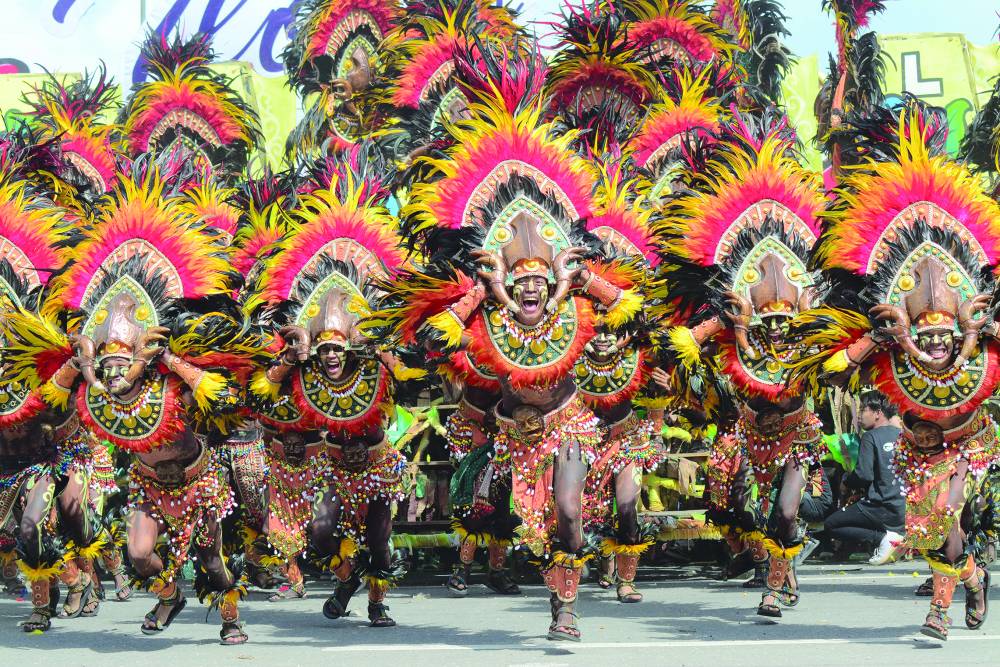
Local festivals
On Saturday, the provincial government of Iloilo, for the first time, hosted Kasadyahan sa Kabanwahanan.
This year’s Kasadyahan highlighted the popular festivals of nine towns in Iloilo—Kaing of Leon, Kasag of Banate, Saad of Leganes, Katagman of Oton, Tultugan of Maasin, Banaag of Anilao, Cry of Jelicuon of New Lucena, Hirinugyaw-Suguidanonay of Calinog and Pantat of Zarraga. Unlike the Ati Tribes competition that has specific themes (warriors and dancers) and musical accompaniment (mainly percussion), the Kasadyahan was focused on the “bugal” or “pride of place.”
These include Leon’s tradition of making kaing (basket made of bamboo strips), the abundant blue crabs of Banate, the religiosity of the people of Leganes, the gold death mask of Oton, the abundant bamboo and its byproducts (musical instruments) of Maasin, among others.
This year’s celebration is not the typical Kasadyahan that featured various festivals in Western Visayas like the MassKara of Bacolod City, Ati-Atihan of Kalibo, Binirayan of San Jose de Buenavista in Antique, Manggahan of Guimaras, etcetera.
On Saturday night, devotees trooped to Plaza Libertad for the Sadsad, a religious activity intended to give the Catholic faithful a venue to express their faith during Dinagyang, which has become popular for its cultural and tourism activities.
For more than an hour, they danced, chanted and prayed to the Holy Child Jesus.
Devotees attend the Sadsad as their “panaad” or solemn vow to God as they recite their petitions or thank God for granting their prayers.Visual treat
But Sunday is the much-awaited, and the most exciting part of the festival because it is the Ati Tribe competition day.
This competition has specific requirements—performers are dressed as warriors and dancers, and the musical accompaniment is mainly percussion (gigantic/improvised bass drums and cymbals, flute, triangle, cymbals, tambourine, etcetera), sometimes with live singing or chanting, depending on a group’s storyline.
The themes of the performances vary, but mainly about the conversion to Christianity of the Ati, the Barter of Panay, the battle against the Moro, among others.
But what makes this competition a visual treat is the choreography: rapid movements of warriors and dancers on mobile platforms and the quick transitions in the storytelling.
Eight school-based tribes are competing: Tribu Ilonganon (Jalandoni Memorial National High School, or NHS), Tribu Mandu-riyaw (Mandurriao NHS), Tribu Paghidaet (La Paz NHS), Tribu Pan-ay (Fort San Pedro NHS), Tribu Salognon (Jaro NHS), Tribu Sigabong (Ramon Avanceña NHS), Tribu Silak (Iloilo City NHS) and Tribu Taga-Baryo (Barrio Obrero NHS).
In the afternoon, the public can join in the street dancing through the Sadsad sa Calle Real. Five groups—Tribu Aninipay, Tribu Ibata sa Paghiliugyon, Tribu Molave, Tribu Panaad, and Tribu Parianon—will lead this merrymaking.
But Dinagyang is incomplete without the gastronomic treats of Ilonggo cuisine.
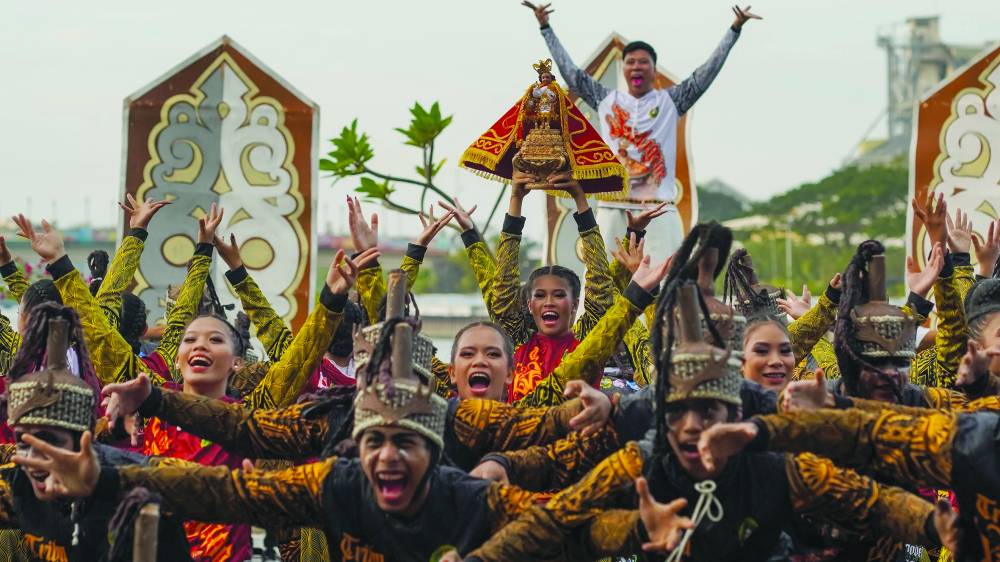
Pride of Iloilo
On the sides of these religious and cultural activities is the food festival in different areas of the metro where family and friends eat together, celebrating the pride of their community.
Mayor Jerry Treñas, in a statement, reiterates why Dinagyang is a pride of Iloilo.
“This year’s edition is also a celebration of the achievements and winnings of Iloilo City for the past two years despite the pandemic,” he said.
He pointed out that last year, Dinagyang was named the Best Cultural Festival (City Category) by the prestigious Pearl Awards from Association of Tourism Officers of the Philippines. The mayor also cited the United Nations Educational, Scientific and Cultural Organization’s recognition of Iloilo City as Creative City of Gastronomy.
Dinagyang started in the late 1960s as a religious celebration.
Devotees of Sto. Niño in Iloilo welcomed the arrival of the image of the Sto. Niño de Cebu with dancing, praying and chanting in the streets surrounding the San Jose de Placer Parish Church in Plaza Libertad.
This celebration was first called Ati-Atihan of Iloilo since it was inspired by the Ati-Atihan of Kalibo in Aklan, another festival dedicated to Sto. Niño.
The management of Ati-Atihan of Iloilo was turned over to the city government of Iloilo in 1977, and named it Dinagyang Festival to differentiate it from Kalibo’s.
In the four decades since then, the festival has gotten grander by the year: Other festivals in Western Visayas were invited to join in the Kasadyahan. Barangay-based tribes were replaced by school-based groups in the Ati Tribes competition. Choreography became more complicated while props got bigger to complement the storytelling and musicality of performances.
The festival is held in the last week of January so the devotees will have time to celebrate other Sto. Niño festivals in the Visayas—the Sinulog of Cebu and Ati-Atihan of Kalibo.
It starts with a “pamukaw” in December of the preceding year, teasing the public that Dinagyang was nearing, followed by an opening program in the first week of January before the grand celebration at the end of the month.
Amid the merrymaking, Treñas reminds fellow Ilonggos of Dinagyang’s deeper purpose.
“Even with numerous awards and recognitions, for me, our greatest accomplishment is our deep sense of pride as Ilonggos. And we offer all the glory and honor to our dear Señor Sto. Niño,” the mayor said. -MARICYN A. DE LOS SANTOS


















